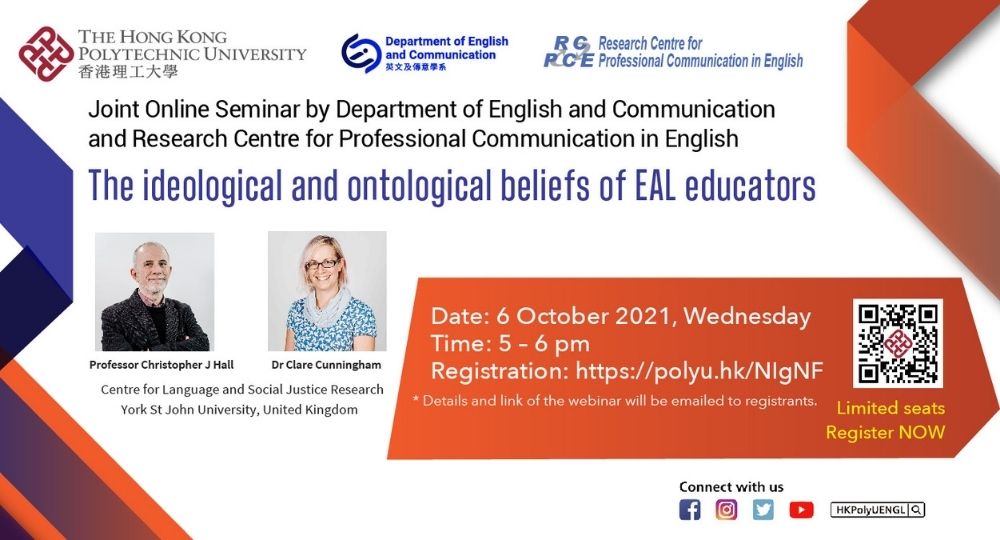Joint Seminar l The ideological and ontological beliefs of EAL educators
Seminars / Lectures / Workshops
RCPCE Events

-
Date
06 Oct 2021
-
Organiser
Department of English and Communication
-
Time
17:00 - 18:00
-
Venue
Zoom
Speaker
Prof. Christopher J Hall
Dr Clare Cunningham
Remarks
This event is jointly organised with the Research Centre for Professional Communication in English, PolyU.
Summary
Educators’ attitudes to their students’ linguistic resources and needs can reinforce and perpetuate social injustice, especially for marginalised populations such as migrant children in English as an Additional Language (EAL) contexts. The educators’ attitudes will be influenced at a fundamental level by the linguistic and social ideologies to which they (more or less consciously) subscribe. Most work on teacher beliefs has concerned their beliefs about learners/learning and teachers/teaching, rather than the language resources and practices developed through learning and teaching, and through which learning and teaching are mediated. Moreover, data on, and discussion of, teachers’ ideological beliefs do not figure centrally in the teacher belief literature. Work on teacher ontologies of English—the ways they conceptualise the language—is almost completely lacking.
In this paper we propose that careful analysis of the sets of ontological beliefs concerning English and other languages that can be inferred from educators’ attitudinal discourse can shed light on how ideological beliefs which reinforce and perpetuate social injustices prosper in the educational system. Analysis of interview data from educators working with EAL students at seven primary schools in the north of England suggests a pervasive hegemonic ideological stance, consistent with the ‘monolingual habitus’, in which English is commonly positioned as ‘language itself’ and other languages are associated with different levels of cultural capital. From these beliefs we use an ontological framework to infer shared conceptualizations of English and other languages, and of nation and national identity, separately from the values associated with them. We address how the ontological analysis can potentially be used in teacher development programmes to allow educators to understand and reassess their own ideologies and professional practices, challenging and more effectively resisting unfair and harmful narratives from above.
The replay of this webinar is available on the Department's YouTube channel from this link.
Keynote Speaker
Prof. Christopher J Hall
Centre for Language and Social Justice Research, York St John University, United Kingdom
Christopher J. Hall is Professor of Applied Linguistics at York St John University in the UK. He has conducted research on morphological universals, the development and organisation of the multilingual lexicon, and non-native lexical usage. His current research focuses on teachers’ conceptualisations of English from the perspective of Global Englishes. He has authored several books, book chapters and journal articles, including Mapping Applied Linguistics: A Guide for Students and Practitioners (co‑author) and Mapping Applied Linguistics: A Guide for Students and PractitionersMapping Applied Linguistics: A Guide for Students and Practitioners (co‑editor)Mapping Applied Linguistics: A Guide for Students and Practitioners He also co‑created the online course for teachers, Mapping Applied Linguistics: A Guide for Students and Practitioners (www.changingenglishes.online), now in its second edition.
Dr Clare Cunningham
Centre for Language and Social Justice Research, York St John University, United Kingdom
Clare Cunningham is a Senior Lecturer in English language and linguistics at York St John University in the UK. Her research has principally been focused on the attitudes, beliefs and knowledge of teachers with regards to multilingualism and she has published on this topic in Language and Education, Language and Education, Language and Education and Language and Education. She is currently engaged in a large‑scale pan‑European project furthering this research through a comparative study within the AILA Research Network ALanguage and Education. Another research interest is in the area of eco-linguistics and she is currently involved in two research projects in this area, one focused on students’ discourses about ecojustice in the higher education curriculum and another exploring childrens’ written eco-narratives.




